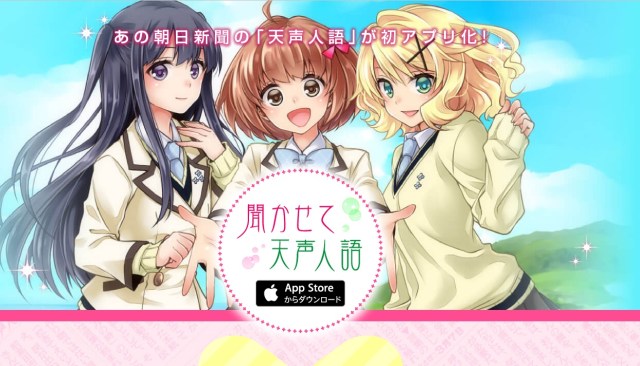Asahi Shimbun
“As long as everybody is videotaping everyone else, justice will be done.” (Marge Simpson)
As in any country, a Japanese newspaper’s credibility often rests on a very fine political line. If their reporting leans even a little left or right, they run the risk of being called a stack of toilet paper scribbled on by talentless hacks by half the population. It’s a precarious position, and one in which releasing an app wherein you dress up school girls as a reward for current event awareness only seems to provide fuel for your detractors.
And yet on October 14 one of Japan’s leading newspapers, Asahi Shimbun, released just such an app called Kikasete Tensei Jingo. It features several moe girls reading from selected editions of the paper’s long-running Tensei Jingo editorial column. However, as pointless as it may appear on the surface there is some heavy language practice potential buried in there.
On March 18, three terrorists attacked and took hostage patrons at the Bardo National Museum in Tunisia, killing 21 people and injuring about 50 others. Among those injured was Noriko Yuki, a Japanese tourist visiting Tunisia with her mother.
Ms. Yuki sustained a gunshot wound in the attack and was taken to a nearby hospital for treatment. There, shortly after her surgery, she was immediately bombarded by Japanese media looking to interview her, with some members of the press apparently going so far as to tell the Japanese ambassador watching over her that he did “not have the authority to stop us from interviewing her.”




 Japanese drugstore sells onigiri at pre-stupid era prices, but how do they compare to 7-Eleven?
Japanese drugstore sells onigiri at pre-stupid era prices, but how do they compare to 7-Eleven? Starbucks Japan releases first-ever Hinamatsuri Girls’ Day Frappuccino
Starbucks Japan releases first-ever Hinamatsuri Girls’ Day Frappuccino Japan Extreme Budget Travel! A trip from Tokyo to Izumo for just 30,000 yen [Part 1]
Japan Extreme Budget Travel! A trip from Tokyo to Izumo for just 30,000 yen [Part 1] What’s the best way to spend 1,000 yen at Denny’s in Japan?
What’s the best way to spend 1,000 yen at Denny’s in Japan? Magical senzu beans from Dragon Ball now available in chocolate form!
Magical senzu beans from Dragon Ball now available in chocolate form! Naruto and Converse team up for new line of shinobi sneakers[Photos]
Naruto and Converse team up for new line of shinobi sneakers[Photos] A look back on 40 years of Japanese schools banning stuff
A look back on 40 years of Japanese schools banning stuff The Hayao Miyazaki anime we never got – New art book reveals Ghibli legend’s unrealized concepts
The Hayao Miyazaki anime we never got – New art book reveals Ghibli legend’s unrealized concepts 7-Eleven Japan’s sakura sweets season is underway right now!
7-Eleven Japan’s sakura sweets season is underway right now! Japan Extreme Budget Travel! A trip from Tokyo to Izumo for just 30,000 yen [Part 2]
Japan Extreme Budget Travel! A trip from Tokyo to Izumo for just 30,000 yen [Part 2] The 10 most annoying things foreign tourists do on Japanese trains, according to locals
The 10 most annoying things foreign tourists do on Japanese trains, according to locals Highest Starbucks in Japan set to open this spring in the Tokyo sky
Highest Starbucks in Japan set to open this spring in the Tokyo sky Tokyo Skytree turns pink for the cherry blossom season
Tokyo Skytree turns pink for the cherry blossom season Starbucks Japan releases new sakura goods and drinkware for cherry blossom season 2026
Starbucks Japan releases new sakura goods and drinkware for cherry blossom season 2026 Japan’s new “Cunte” contact lenses aren’t pronounced like you’re probably thinking they are
Japan’s new “Cunte” contact lenses aren’t pronounced like you’re probably thinking they are Shibuya Station’s Hachiko Gate and Yamanote Line stairway locations change next month
Shibuya Station’s Hachiko Gate and Yamanote Line stairway locations change next month Yakuzen ramen restaurant in Tokyo is very different to a yakuza ramen restaurant
Yakuzen ramen restaurant in Tokyo is very different to a yakuza ramen restaurant Starbucks Japan adds new sakura Frappuccino and cherry blossom drinks to the menu
Starbucks Japan adds new sakura Frappuccino and cherry blossom drinks to the menu Japan just had its first same-month foreign tourist decrease in four years
Japan just had its first same-month foreign tourist decrease in four years Burning through cash just to throw things away tops list of headaches when moving house in Japan
Burning through cash just to throw things away tops list of headaches when moving house in Japan Japan’s newest Shinkansen has no seats…or passengers [Video]
Japan’s newest Shinkansen has no seats…or passengers [Video] Foreigners accounting for over 80 percent of off-course skiers needing rescue in Japan’s Hokkaido
Foreigners accounting for over 80 percent of off-course skiers needing rescue in Japan’s Hokkaido Super-salty pizza sends six kids to the hospital in Japan, linguistics blamed
Super-salty pizza sends six kids to the hospital in Japan, linguistics blamed Starbucks Japan unveils new sakura Frappuccino for cherry blossom season 2026
Starbucks Japan unveils new sakura Frappuccino for cherry blossom season 2026 Foreign tourists in Japan will get free Shinkansen tickets to promote regional tourism
Foreign tourists in Japan will get free Shinkansen tickets to promote regional tourism Take a trip to Japan’s Dododo Land, the most irritating place on Earth
Take a trip to Japan’s Dododo Land, the most irritating place on Earth Is China’s don’t-go-to-Japan warning affecting the lines at a popular Tokyo gyukatsu restaurant?
Is China’s don’t-go-to-Japan warning affecting the lines at a popular Tokyo gyukatsu restaurant? Survey asks foreign tourists what bothered them in Japan, more than half gave same answer
Survey asks foreign tourists what bothered them in Japan, more than half gave same answer Japan’s human washing machines will go on sale to general public, demos to be held in Tokyo
Japan’s human washing machines will go on sale to general public, demos to be held in Tokyo Starbucks Japan releases new drinkware and goods for Valentine’s Day
Starbucks Japan releases new drinkware and goods for Valentine’s Day We deeply regret going into this tunnel on our walk in the mountains of Japan
We deeply regret going into this tunnel on our walk in the mountains of Japan Studio Ghibli releases Kodama forest spirits from Princess Mononoke to light up your home
Studio Ghibli releases Kodama forest spirits from Princess Mononoke to light up your home Major Japanese hotel chain says reservations via overseas booking sites may not be valid
Major Japanese hotel chain says reservations via overseas booking sites may not be valid Put sesame oil in your coffee? Japanese maker says it’s the best way to start your day【Taste test】
Put sesame oil in your coffee? Japanese maker says it’s the best way to start your day【Taste test】 No more using real katana for tourism activities, Japan’s National Police Agency says
No more using real katana for tourism activities, Japan’s National Police Agency says Naruto and Converse team up for new line of shinobi sneakers[Photos]
Naruto and Converse team up for new line of shinobi sneakers[Photos] A look back on 40 years of Japanese schools banning stuff
A look back on 40 years of Japanese schools banning stuff The Hayao Miyazaki anime we never got – New art book reveals Ghibli legend’s unrealized concepts
The Hayao Miyazaki anime we never got – New art book reveals Ghibli legend’s unrealized concepts 7-Eleven Japan’s sakura sweets season is underway right now!
7-Eleven Japan’s sakura sweets season is underway right now! Japan Extreme Budget Travel! A trip from Tokyo to Izumo for just 30,000 yen [Part 2]
Japan Extreme Budget Travel! A trip from Tokyo to Izumo for just 30,000 yen [Part 2] Rage against the smoothie machine with this 7-Eleven drink hack【Taste test】
Rage against the smoothie machine with this 7-Eleven drink hack【Taste test】 Super Budget Dining in Japan – What’s the best way to spend 1,000 yen (US$6.70) at Saizeriya?
Super Budget Dining in Japan – What’s the best way to spend 1,000 yen (US$6.70) at Saizeriya? Testing out Japan’s portable no-electricity multi-function washing/drying machine【Pics】
Testing out Japan’s portable no-electricity multi-function washing/drying machine【Pics】 Japan Super Budget Dining – What’s the best way to spend 1,000 yen at Doutor?
Japan Super Budget Dining – What’s the best way to spend 1,000 yen at Doutor? Senkoji: The Japanese temple that’s more like a theme park to heaven and hell
Senkoji: The Japanese temple that’s more like a theme park to heaven and hell If Fast and Furious was about 1970s Japanese truckers, this dekotora would be the star【Photos】
If Fast and Furious was about 1970s Japanese truckers, this dekotora would be the star【Photos】 Japan Super Budget Dining – What’s the best way to spend 1,000 yen at Yoshinoya?
Japan Super Budget Dining – What’s the best way to spend 1,000 yen at Yoshinoya? Viral 3D ice creams land in Japan… but are they worth the hype?
Viral 3D ice creams land in Japan… but are they worth the hype? Japan Super Budget Dining – What’s the best way to spend 1,000 yen at beef bowl chain Sukiya?
Japan Super Budget Dining – What’s the best way to spend 1,000 yen at beef bowl chain Sukiya?